曼昆微观经济学习题.doc
- 格式:doc
- 大小:583.00 KB
- 文档页数:66
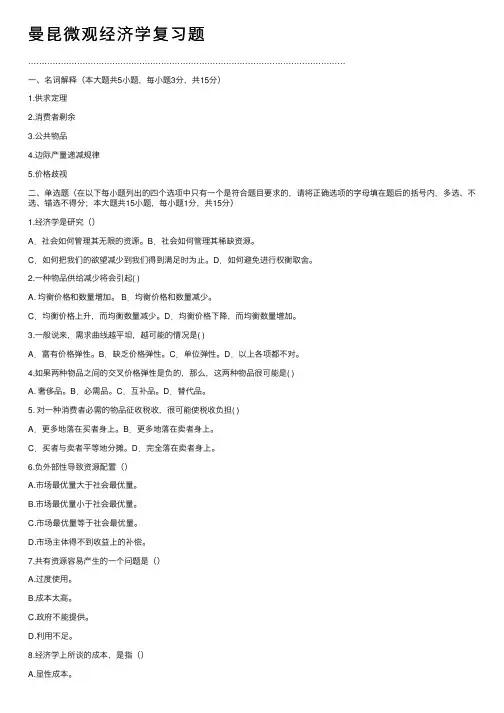
曼昆微观经济学复习题………………………………………………………………………………………………………⼀、名词解释(本⼤题共5⼩题,每⼩题3分,共15分)1.供求定理2.消费者剩余3.公共物品4.边际产量递减规律5.价格歧视⼆、单选题(在以下每⼩题列出的四个选项中只有⼀个是符合题⽬要求的,请将正确选项的字母填在题后的括号内,多选、不选、错选不得分;本⼤题共15⼩题,每⼩题1分,共15分)1.经济学是研究()A.社会如何管理其⽆限的资源。
B.社会如何管理其稀缺资源。
C.如何把我们的欲望减少到我们得到满⾜时为⽌。
D.如何避免进⾏权衡取舍。
2.⼀种物品供给减少将会引起( )A. 均衡价格和数量增加。
B.均衡价格和数量减少。
C.均衡价格上升,⽽均衡数量减少。
D.均衡价格下降,⽽均衡数量增加。
3.⼀般说来,需求曲线越平坦,越可能的情况是( )A.富有价格弹性。
B.缺乏价格弹性。
C.单位弹性。
D.以上各项都不对。
4.如果两种物品之间的交叉价格弹性是负的,那么,这两种物品很可能是( )A. 奢侈品。
B.必需品。
C.互补品。
D.替代品。
5. 对⼀种消费者必需的物品征收税收,很可能使税收负担( )A.更多地落在买者⾝上。
B.更多地落在卖者⾝上。
C.买者与卖者平等地分摊。
D.完全落在卖者⾝上。
6.负外部性导致资源配置()A.市场最优量⼤于社会最优量。
B.市场最优量⼩于社会最优量。
C.市场最优量等于社会最优量。
D.市场主体得不到收益上的补偿。
7.共有资源容易产⽣的⼀个问题是()A.过度使⽤。
B.成本太⾼。
C.政府不能提供。
D.利⽤不⾜。
8.经济学上所谈的成本,是指()A.显性成本。
B.隐性成本。
C.显性成本与隐性成本。
D.企业的花费。
9.⽣产的有效规模是使以下哪⼀项最⼩的产量?()A.平均总成本。
B.边际成本。
C.平均固定成本。
D.平均可变成本。
10.以下哪⼀项不是完全竞争市场的特征? ()A.市场上有许多买者与卖者。
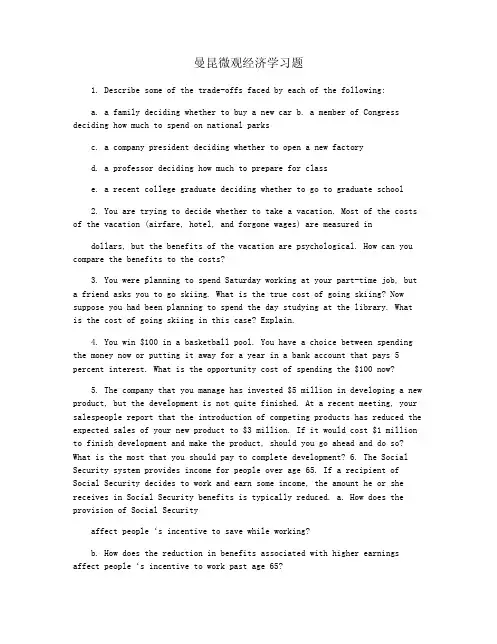
曼昆微观经济学习题1. Describe some of the trade-offs faced by each of the following:a. a family deciding whether to buy a new carb. a member of Congress deciding how much to spend on national parksc. a company president deciding whether to open a new factoryd. a professor deciding how much to prepare for classe. a recent college graduate deciding whether to go to graduate school2. You are trying to decide whether to take a vacation. Most of the costs of the vacation (airfare, hotel, and forgone wages) are measured indollars, but the benefits of the vacation are psychological. How can you compare the benefits to the costs?3. You were planning to spend Saturday working at your part-time job, buta friend asks you to go skiing. What is the true cost of going skiing? Now suppose you had been planning to spend the day studying at the library. Whatis the cost of going skiing in this case? Explain.4. You win $100 in a basketball pool. You have a choice between spending the money now or putting it away for a year in a bank account that pays 5 percent interest. What is the opportunity cost of spending the $100 now?5. The company that you manage has invested $5 million in developing a new product, but the development is not quite finished. At a recent meeting, your salespeople report that the introduction of competing products has reduced the expected sales of your new product to $3 million. If it would cost $1 million to finish development and make the product, should you go ahead and do so? What is the most that you should pay to complete development?6. The Social Security system provides income for people over age 65. If a recipient of Social Security decides to work and earn some income, the amount he or she receives in Social Security benefits is typically reduced. a. How does the provision of Social Securityaffect people‘s incentive to save while working?b. How does the reduction in benefits associated with higher earnings affect people‘s incentive to work past age 65?7. A 1996 bill reforming the federal government‘s antipoverty programs limited many welfare recipients to only two years of benefits. a. How doesthis change affect the incentives for working?b. How might this change represent a trade-off between equality and efficiency?8. Your roommate is a better cook than you are, but you can clean more quickly than your roommate can. If your roommate did all the cooking and you did all the cleaning, would your chores take you more or less time than if you divided each task evenly? Give a similar example of how specialization and trade can make two countries both better off.9. Explain whether each of the following government activities is motivated by a concern about equality or a concern about efficiency. In the case of efficiency, discuss the type of market failure involved.a. regulating cable TV pricesb. providing some poor people with vouchers that can be used to buy foodc. prohibiting smoking in public placesd. breaking up Standard Oil (which once owned 90 percent of all oil refineries) into several smaller companiese. imposing higher personal income tax rates on people with higher incomesf. instituting laws against driving while intoxicated10. Discuss each of the following statements from the standpoints of equality and efficiency. a. �DEveryone in society should be guaranteed the best healthcare possible.‖b. �DWhen workers are laid off, they should be able to collect unemployment benefits until they find a new job.‖11. In what ways is your standard of living differentfrom that of your parents or grandparents when they were your age? Why have these changes occurred?12. Suppose Americans decide to save more of their incomes. If banks lend this extra saving to businesses, which use the funds to build new factories, how might this lead to faster growth in productivity? Who do you suppose benefits from the higher productivity? Is society getting a free lunch?13. In 2021, President Barack Obama and Congress enacted a healthcare reform bill in the United States. Two goals of the bill were to provide more Americans with health insurance (via subsidies for lower-income households financed by taxes on higher-income households) and to reduce the cost of healthcare (via various reforms in how healthcare is provided). a. How do these goals relate to equality and efficiency?b. How might healthcare reform increase productivity in the United States?c. How might healthcare reform decrease productivity in the United States?14. During the Revolutionary War, the American colonies could not raise enough tax revenue to fully fund the war effort; to make up this difference, the colonies decided to print more money. Printing money to cover expenditures is sometimes referred to as an �Dinflation tax.‖ Who do you think is being �Dtaxed‖ when more money is printed? Why?15. Imagine that you are a policymaker trying to decide whether to reduce the rate of inflation. To make an intelligent decision, what would you need to know about inflation, unemployment, and the trade-off between them?16. A policymaker is deciding how to finance the construction of a new airport. He can either pay for it by increasing citizens‘ taxes or byprinting more money. What are some of the short-run and long-run consequences of each option?1. Draw a circular-flow diagram. Identify the parts of the model that correspond to the flow of goods and services and the flow of dollars for each of the following activities. a. Selena pays a storekeeper $1 for a quart of milk.b. Stuart earns $4.50 per hour working at a fastfood restaurant.c. Shanna spends $30 to get a haircut.d. Sally earns $10,000 from her 10 percent ownership of Acme Industrial.2. Imagine a society that produces military goods and consumer goods, which we‘ll call �Dguns‖ and �Dbutter.‖a. Draw a production possibilities frontier for guns and butter. Using the concept of opportunity cost, explain why it most likely has a bowed-out shape.b. Show a point that is impossible for the economy to achieve. Show apoint that is feasible but inefficient.c. Imagine that the society has two political parties, called the Hawks (who want a strong military) and the Doves (who want a smaller military). Show a point on your production possibilities frontier that the Hawks might choose and a point the Doves might choose.d. Imagine that an aggressive neighboring country reduces the size of its military. As a result, both the Hawks and the Doves reduce their desired production of guns by the same amount. Which party would get the bigger�Dpeace dividend,‖ measured by the increase in butter production? Explain.3. The first principle of economics discussed in Chapter 1 is that people face trade-offs. Use a production possibilities frontier to illustratesociety‘s trade-off between two �Dgoods‖―a clean environment and the quantity of industrial output. What do you suppose determines the shape and position of the frontier? Show what happens to the frontier if engineersdevelop a new way of producing electricity that emits fewer pollutants.4. An economy consists of three workers: Larry, Moe, and Curly. Each works ten hours a day and can produce two services: mowing lawns and washing cars.In an hour, Larry can either mow one lawn or wash one car; Moe can either mow one lawn or wash two cars; and Curly can either mow two lawns or wash one car.a. Calculate how much of each service is produced under the following circumstances, which we label A, B, C, and D: ? All three spend all their time mowing lawns. (A)All three spend all their time washing cars. (B)All three spend half their time on each activity. (C)Larry spends half his time on each activity, while Moe only washes cars and Curly only mows lawns. (D)b. Graph the production possibilities frontier for this economy. Usingyour answers to part (a), identify points A, B, C, and D on your graph.c. Explain why the production possibilities frontier has the shape it does.d. Are any of the allocations calculated in part (a) inefficient? Explain.5. Classify the following topics as relating to microeconomics or macroeconomics. a. a family‘s decision about how much income to saveb. the effect of government regulations on auto emissionsc. the impact of higher national saving on economic growthd. a firm‘s decision about how many workers to hiree. the relationship between the inflation rate and changes in the quantity of money 6. Classify each of the following statements as positive or normative. Explain.a. Society faces a short-run trade-off between感谢您的阅读,祝您生活愉快。
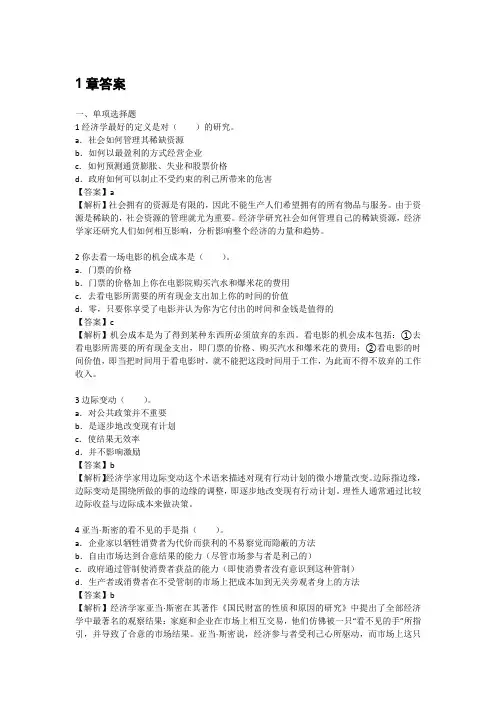
1章答案一、单项选择题1经济学最好的定义是对()的研究。
a.社会如何管理其稀缺资源b.如何以最盈利的方式经营企业c.如何预测通货膨胀、失业和股票价格d.政府如何可以制止不受约束的利己所带来的危害【答案】a【解析】社会拥有的资源是有限的,因此不能生产人们希望拥有的所有物品与服务。
由于资源是稀缺的,社会资源的管理就尤为重要。
经济学研究社会如何管理自己的稀缺资源,经济学家还研究人们如何相互影响,分析影响整个经济的力量和趋势。
2你去看一场电影的机会成本是()。
a.门票的价格b.门票的价格加上你在电影院购买汽水和爆米花的费用c.去看电影所需要的所有现金支出加上你的时间的价值d.零,只要你享受了电影并认为你为它付出的时间和金钱是值得的【答案】c【解析】机会成本是为了得到某种东西所必须放弃的东西。
看电影的机会成本包括:①去看电影所需要的所有现金支出,即门票的价格、购买汽水和爆米花的费用;②看电影的时间价值,即当把时间用于看电影时,就不能把这段时间用于工作,为此而不得不放弃的工作收入。
3边际变动()。
a.对公共政策并不重要b.是逐步地改变现有计划c.使结果无效率d.并不影响激励【答案】b【解析】经济学家用边际变动这个术语来描述对现有行动计划的微小增量改变。
边际指边缘,边际变动是围绕所做的事的边缘的调整,即逐步地改变现有行动计划。
理性人通常通过比较边际收益与边际成本来做决策。
4亚当·斯密的看不见的手是指()。
a.企业家以牺牲消费者为代价而获利的不易察觉而隐蔽的方法b.自由市场达到合意结果的能力(尽管市场参与者是利己的)c.政府通过管制使消费者获益的能力(即使消费者没有意识到这种管制)d.生产者或消费者在不受管制的市场上把成本加到无关旁观者身上的方法【答案】b【解析】经济学家亚当·斯密在其著作《国民财富的性质和原因的研究》中提出了全部经济学中最著名的观察结果:家庭和企业在市场上相互交易,他们仿佛被一只“看不见的手”所指引,并导致了合意的市场结果。
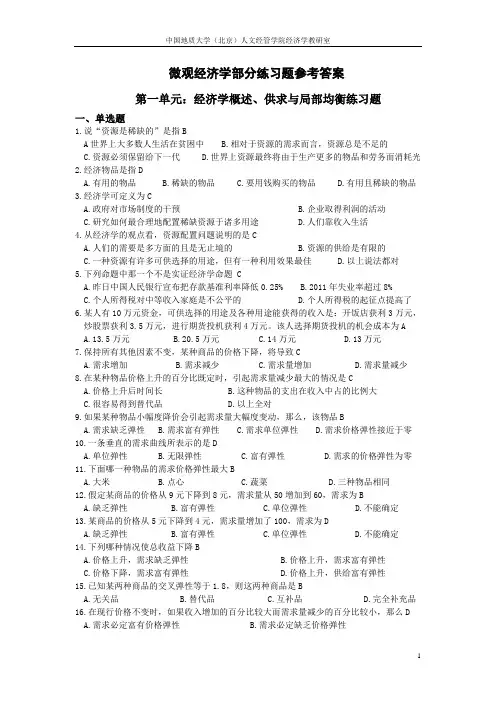
微观经济学部分练习题参考答案第一单元:经济学概述、供求与局部均衡练习题一、单选题1.说“资源是稀缺的”是指BA世界上大多数人生活在贫困中 B.相对于资源的需求而言,资源总是不足的C.资源必须保留给下一代D.世界上资源最终将由于生产更多的物品和劳务而消耗光2.经济物品是指DA.有用的物品B.稀缺的物品C.要用钱购买的物品D.有用且稀缺的物品3.经济学可定义为CA.政府对市场制度的干预B.企业取得利润的活动C.研究如何最合理地配置稀缺资源于诸多用途D.人们靠收入生活4.从经济学的观点看,资源配置问题说明的是CA.人们的需要是多方面的且是无止境的B.资源的供给是有限的C.一种资源有许多可供选择的用途,但有一种利用效果最佳D.以上说法都对5.下列命题中那一个不是实证经济学命题 CA.昨日中国人民银行宣布把存款基准利率降低0.25%B.2011年失业率超过8%C.个人所得税对中等收入家庭是不公平的D.个人所得税的起征点提高了6.某人有10万元资金,可供选择的用途及各种用途能获得的收入是:开饭店获利3万元,炒股票获利3.5万元,进行期货投机获利4万元。
该人选择期货投机的机会成本为AA.13.5万元B.20.5万元C.14万元D.13万元7.保持所有其他因素不变,某种商品的价格下降,将导致CA.需求增加B.需求减少C.需求量增加D.需求量减少8.在某种物品价格上升的百分比既定时,引起需求量减少最大的情况是CA.价格上升后时间长B.这种物品的支出在收入中占的比例大C.很容易得到替代品D.以上全对9.如果某种物品小幅度降价会引起需求量大幅度变动,那么,该物品BA.需求缺乏弹性B.需求富有弹性C.需求单位弹性D.需求价格弹性接近于零10.一条垂直的需求曲线所表示的是DA.单位弹性B.无限弹性C.富有弹性D.需求的价格弹性为零11.下面哪一种物品的需求价格弹性最大BA.大米B.点心C.蔬菜D.三种物品相同12.假定某商品的价格从9元下降到8元,需求量从50增加到60,需求为BA.缺乏弹性B.富有弹性C.单位弹性D.不能确定13.某商品的价格从5元下降到4元,需求量增加了100,需求为DA.缺乏弹性B.富有弹性C.单位弹性D.不能确定14.下列哪种情况使总收益下降BA.价格上升,需求缺乏弹性B.价格上升,需求富有弹性C.价格下降,需求富有弹性D.价格上升,供给富有弹性15.已知某两种商品的交叉弹性等于1.8,则这两种商品是BA.无关品B.替代品C.互补品D.完全补充品16.在现行价格不变时,如果收入增加的百分比较大而需求量减少的百分比较小,那么DA.需求必定富有价格弹性B.需求必定缺乏价格弹性C.所涉及的是正常物品D.所涉及的是低档物品17.收入增加10%引起现行价格下需求量减少5%,收入弹性是BA.0.5B.-0.5C.2.0D.-2.018.小李的月收入从950元增加到1050元,结果他决定每月看电影的次数增加一倍,小李对电影的需求CA.富有价格弹性B.缺乏价格弹性C.富有收入弹性D.缺乏收入弹性19.如果沙特王国认为石油输出国组织石油供给量增加会增加石油销售总收益,那么,沙特人就一定相信石油的需求CA.收入缺乏弹性B.收入富有弹性C.价格富有弹性D.价格缺乏弹性20.如果A物品与B物品是替代品,那么CA.A与B之间需求的交叉弹性是零B. A与B之间需求的交叉弹性是负值C.A与B之间需求的交叉弹性是正值D.它们的需求收入弹性都是负值21.假定汉堡包与炸薯条之间的需求交叉弹性为负值,那么BA.汉堡包价格上升将引起炸薯条的均衡价格上升B.汉堡包价格上升将引起炸薯条的均衡价格下降C.汉堡包价格上升对炸薯条的均衡价格没有影响D.它们是替代品22.长期供给弹性DA.比即时供给富有弹性,但比短期供给缺乏弹性B.比即时供给与短期供给都缺乏弹性C.比即时供给缺乏弹性,但比短期供给富有弹性D.比即时供给与短期供给都富有弹性23.某消费者的收入下降,而他对某商品的需求却增加,该商品为AA.低档商品B.替代商品C.互补商品D.一般商品24.若某产品的供给弹性无穷大,当该产品的需求增加时,则CA均衡价格和均衡产量同时增加 B.均衡价格和均衡产量同时减少C.均衡产量增加但价格不变D.均衡价格上升但产量不变25.垂直的供给曲线表示BA.在一固定的价格无限制地提供某种产品B.价格的变化对供给量没有影响C.价格与供给量成反方向变化D.该行业被垄断26.斜直线型需求曲线的弹性为CA.曲线上各点的弹性都相同B.在高的价格段缺乏弹性,在低的价格段富有弹性C.在高的价格段富有弹性,在低的价格段缺乏弹性D.在某些点上为单位弹性27.某商品价格下降导致其互补品的BA.需求曲线向左移动B.需求曲线向右移动C.供给曲线向右移动D.价格上升28.某商品的需求曲线向下倾斜,如果该商品的价格从3元下降到2.75元,则DA.该商品需求下降B.该商品需求上升C.该商品需求量下降D.该商品需求量上升29.下列不会引起牛排需求发生变化的情况为AA.牛排价格从每斤20元上升到每斤22元B.牛的饲养者宣传牛排中富含维生素C.医生说多吃牛肉有损健康D.汉堡包价格从每个12元下降到10元30.如果甲产品价格下降引起乙产品需求曲线向右移动,那么BA.甲和乙是互替商品B.甲和乙是互补商品C.甲为低档商品,乙为高档商品D.甲为高档商品,乙为低档商品31.商品需求量随着价格的下降而上升,这是因为CA.价格下降导致供给下降B.价格下降使需求曲线右移C.人们实际收入的提高增加了对商品的消费D.为获得均衡,价格下降后需求必须增加32.收入和偏好是BA.影响供给的因素B.影响需求的因素C.在经济分析中可以忽略D.上述都不正确33.随着奶油均衡价格的下降AA.人造奶油的需求曲线向左下移动B.人造奶油的需求曲线向右上移动C.人造奶油的供给曲线向左下移动D.人造奶油的供给曲线向右上移动34.若小麦的需求曲线向右上移动,那将DA.导致小麦价格的下降B.不会改变小麦的产量C.导致小麦供给的增加而减少其它商品的供给D.导致玉米的供给量增加35.斜直线型需求曲线的斜率不变,因此其价格弹性也不变。
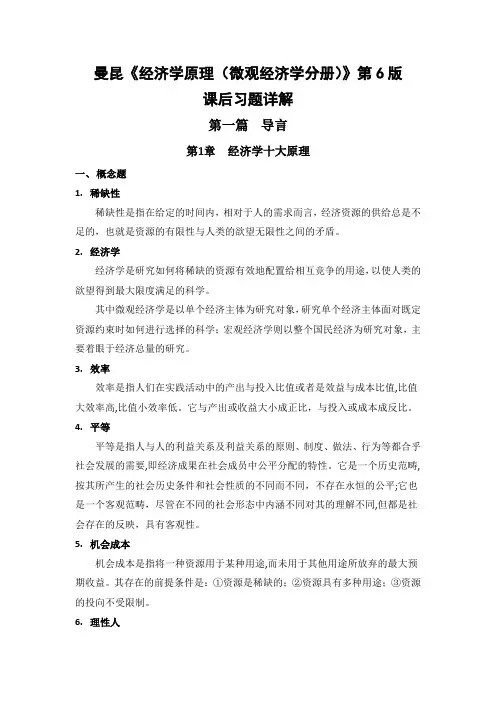
曼昆《经济学原理(微观经济学分册)》第6版课后习题详解第一篇导言第1章经济学十大原理一、概念题1.稀缺性稀缺性是指在给定的时间内,相对于人的需求而言,经济资源的供给总是不足的,也就是资源的有限性与人类的欲望无限性之间的矛盾。
2.经济学经济学是研究如何将稀缺的资源有效地配置给相互竞争的用途,以使人类的欲望得到最大限度满足的科学。
其中微观经济学是以单个经济主体为研究对象,研究单个经济主体面对既定资源约束时如何进行选择的科学;宏观经济学则以整个国民经济为研究对象,主要着眼于经济总量的研究。
3.效率效率是指人们在实践活动中的产出与投入比值或者是效益与成本比值,比值大效率高,比值小效率低。
它与产出或收益大小成正比,与投入或成本成反比。
4.平等平等是指人与人的利益关系及利益关系的原则、制度、做法、行为等都合乎社会发展的需要,即经济成果在社会成员中公平分配的特性。
它是一个历史范畴,按其所产生的社会历史条件和社会性质的不同而不同,不存在永恒的公平;它也是一个客观范畴,尽管在不同的社会形态中内涵不同对其的理解不同,但都是社会存在的反映,具有客观性。
5.机会成本机会成本是指将一种资源用于某种用途,而未用于其他用途所放弃的最大预期收益。
其存在的前提条件是:①资源是稀缺的;②资源具有多种用途;③资源的投向不受限制。
6.理性人理性人是指系统而有目的地尽最大努力去实现其目标的人,是经济研究中所假设的、在一定条件下具有典型理性行为的经济活动主体.7.边际变动边际变动是指对行动计划的微小增量调整。
8.激励激励是指引起一个人做出某种行为的某种东西。
9.市场经济市场经济是指由家庭和企业在市场上的相互交易决定资源配置的经济,而资源配置实际上就是决定社会生产什么、生产多少、如何生产以及为谁生产的过程。
10.产权产权是指个人拥有并控制稀缺资源的能力,也可以理解为人们对其所交易东西的所有权,即人们在交易活动中使自己或他人在经济利益上受益或受损的权力。
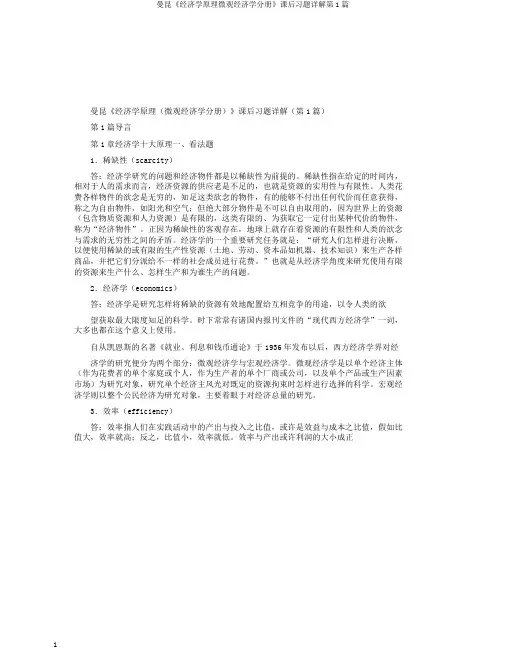
曼昆《经济学原理(微观经济学分册)》课后习题详解(第1篇)第1篇导言第1章经济学十大原理一、看法题1.稀缺性(scarcity)答:经济学研究的问题和经济物件都是以稀缺性为前提的。
稀缺性指在给定的时间内,相对于人的需求而言,经济资源的供应老是不足的,也就是资源的实用性与有限性。
人类花费各样物件的欲念是无穷的,知足这类欲念的物件,有的能够不付出任何代价而任意获得,称之为自由物件,如阳光和空气;但绝大部分物件是不可以自由取用的,因为世界上的资源(包含物质资源和人力资源)是有限的,这类有限的、为获取它一定付出某种代价的物件,称为“经济物件”。
正因为稀缺性的客观存在,地球上就存在着资源的有限性和人类的欲念与需求的无穷性之间的矛盾。
经济学的一个重要研究任务就是:“研究人们怎样进行决断,以便使用稀缺的或有限的生产性资源(土地、劳动、资本品如机器、技术知识)来生产各样商品,并把它们分派给不一样的社会成员进行花费。
”也就是从经济学角度来研究使用有限的资源来生产什么、怎样生产和为谁生产的问题。
2.经济学(economics)答:经济学是研究怎样将稀缺的资源有效地配置给互相竞争的用途,以令人类的欲望获取最大限度知足的科学。
时下常常有诸国内报刊文件的“现代西方经济学”一词,大多也都在这个意义上使用。
自从凯恩斯的名著《就业、利息和钱币通论》于1936年发布以后,西方经济学界对经济学的研究便分为两个部分:微观经济学与宏观经济学。
微观经济学是以单个经济主体(作为花费者的单个家庭或个人,作为生产者的单个厂商或公司,以及单个产品或生产因素市场)为研究对象,研究单个经济主风光对既定的资源拘束时怎样进行选择的科学。
宏观经济学则以整个公民经济为研究对象,主要着眼于对经济总量的研究。
3.效率(efficiency)答:效率指人们在实践活动中的产出与投入之比值,或许是效益与成本之比值,假如比值大,效率就高;反之,比值小,效率就低。
效率与产出或许利润的大小成正比,而与成本或投入成反比,也就是说,假如想提升效率,一定降低成本或投入,提升利润或产出。
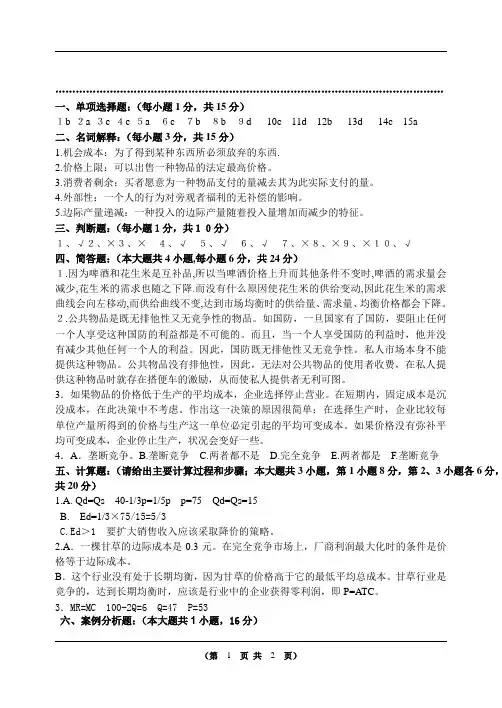
……………………………………………………………………………………………………一、单项选择题:(每小题1分,共15分)1b 2a 3c 4c 5a6c7b8b 9d 10c11d12b 13d 14c 15a二、名词解释:(每小题3分,共15分)1.机会成本:为了得到某种东西所必须放弃的东西.2.价格上限:可以出售一种物品的法定最高价格。
3.消费者剩余:买者愿意为一种物品支付的量减去其为此实际支付的量。
4.外部性:一个人的行为对旁观者福利的无补偿的影响。
5.边际产量递减:一种投入的边际产量随着投入量增加而减少的特征。
三、判断题:(每小题1分,共10分)1、√2、×3、×4、√5、√6、√7、×8、×9、×10、√四、简答题:(本大题共4小题,每小题6分,共24分)1.因为啤酒和花生米是互补品,所以当啤酒价格上升而其他条件不变时,啤酒的需求量会减少,花生米的需求也随之下降.而没有什么原因使花生米的供给变动,因此花生米的需求曲线会向左移动,而供给曲线不变,达到市场均衡时的供给量、需求量、均衡价格都会下降。
2.公共物品是既无排他性又无竞争性的物品。
如国防,一旦国家有了国防,要阻止任何一个人享受这种国防的利益都是不可能的。
而且,当一个人享受国防的利益时,他并没有减少其他任何一个人的利益。
因此,国防既无排他性又无竞争性。
私人市场本身不能提供这种物品。
公共物品没有排他性,因此,无法对公共物品的使用者收费,在私人提供这种物品时就存在搭便车的激励,从而使私人提供者无利可图。
3.如果物品的价格低于生产的平均成本,企业选择停止营业。
在短期内,固定成本是沉没成本,在此决策中不考虑。
作出这一决策的原因很简单:在选择生产时,企业比较每单位产量所得到的价格与生产这一单位必定引起的平均可变成本。
如果价格没有弥补平均可变成本,企业停止生产,状况会变好一些。
4.A.垄断竞争。
B.垄断竞争 C.两者都不是 D.完全竞争 E.两者都是 F.垄断竞争五、计算题:(请给出主要计算过程和步骤;本大题共3小题,第1小题8分,第2、3小题各6分,共20分)1.A. Qd=Qs 40-1/3p=1/5p p=75 Qd=Qs=15B. Ed=1/3×75/15=5/3C.Ed>1 要扩大销售收入应该采取降价的策略。
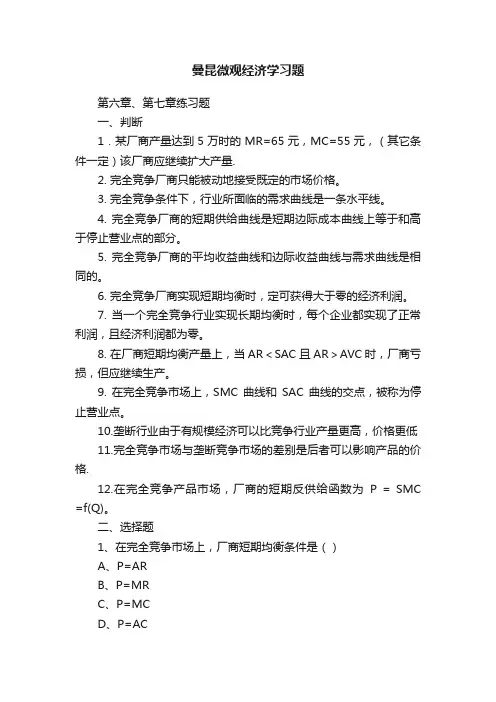
曼昆微观经济学习题第六章、第七章练习题一、判断1.某厂商产量达到5万时的MR=65元,MC=55元,(其它条件一定)该厂商应继续扩大产量.2. 完全竞争厂商只能被动地接受既定的市场价格。
3. 完全竞争条件下,行业所面临的需求曲线是一条水平线。
4. 完全竞争厂商的短期供给曲线是短期边际成本曲线上等于和高于停止营业点的部分。
5. 完全竞争厂商的平均收益曲线和边际收益曲线与需求曲线是相同的。
6. 完全竞争厂商实现短期均衡时,定可获得大于零的经济利润。
7. 当一个完全竞争行业实现长期均衡时,每个企业都实现了正常利润,且经济利润都为零。
8. 在厂商短期均衡产量上,当AR<SAC 且AR>AVC时,厂商亏损,但应继续生产。
9. 在完全竞争市场上,SMC曲线和SAC 曲线的交点,被称为停止营业点。
10.垄断行业由于有规模经济可以比竞争行业产量更高,价格更低11.完全竞争市场与垄断竞争市场的差别是后者可以影响产品的价格.12.在完全竞争产品市场,厂商的短期反供给函数为P = SMC =f(Q)。
二、选择题1、在完全竞争市场上,厂商短期均衡条件是()A、P=ARB、P=MRC、P=MCD、P=AC2、在垄断竞争中()A、为数很少的厂商,有差异的产品B、许多厂商,同质的产品;C、为数很少几个厂商,同质产品D、许多厂商,有差异的产品3、在一般情况下,厂商得到的价格若低于下述哪种成本,他将停止营业?()A、平均可变成本 B、平均成本C、平均不变成本D、边际成本4、在短期,完全垄断厂商()A、无盈亏B、取得最大利润C、发生亏损D、以上情况都可能出现5、下列描述中,不属于完全垄断厂商实行差别定价的条件是()A、市场存在不完全性B、各个市场的需求弹性不同;C、市场未达到均衡状态D、市场必须能有效地分离开来。
6、寡头垄断厂商的产品是()A、同质的B、有差异的C、既可以是同质的,也可以是有差异的D、以上都不对7、P=MC的最大利润原则()A.适用于任何条件下的厂商。
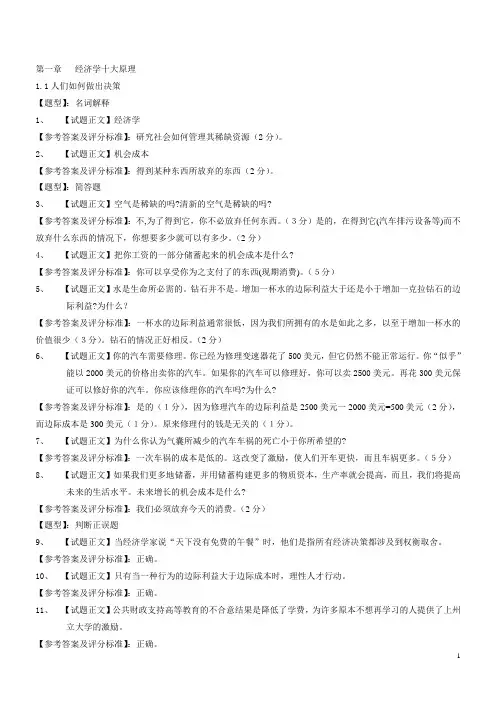
第一章经济学十大原理1.1人们如何做出决策【题型】:名词解释1、【试题正文】经济学【参考答案及评分标准】:研究社会如何管理其稀缺资源(2分)。
2、【试题正文】机会成本【参考答案及评分标准】:得到某种东西所放弃的东西(2分)。
【题型】:简答题3、【试题正文】空气是稀缺的吗?清新的空气是稀缺的吗?【参考答案及评分标准】:不,为了得到它,你不必放弃任何东西。
(3分)是的,在得到它(汽车排污设备等)而不放弃什么东西的情况下,你想要多少就可以有多少。
(2分)4、【试题正文】把你工资的一部分储蓄起来的机会成本是什么?【参考答案及评分标准】:你可以享受你为之支付了的东西(现期消费)。
(5分)5、【试题正文】水是生命所必需的。
钻石并不是。
增加一杯水的边际利益大于还是小于增加一克拉钻石的边际利益?为什么?【参考答案及评分标准】:一杯水的边际利益通常很低,因为我们所拥有的水是如此之多,以至于增加一杯水的价值很少(3分)。
钻石的情况正好相反。
(2分)6、【试题正文】你的汽车需要修理。
你已经为修理变速器花了500美元,但它仍然不能正常运行。
你“似乎”能以2000美元的价格出卖你的汽车。
如果你的汽车可以修理好,你可以卖2500美元。
再花300美元保证可以修好你的汽车。
你应该修理你的汽车吗?为什么?【参考答案及评分标准】:是的(1分),因为修理汽车的边际利益是2500美元一2000美元=500美元(2分),而边际成本是300美元(1分)。
原来修理付的钱是无关的(1分)。
7、【试题正文】为什么你认为气囊所减少的汽车车祸的死亡小于你所希望的?【参考答案及评分标准】:一次车祸的成本是低的。
这改变了激励,使人们开车更快,而且车祸更多。
(5分)8、【试题正文】如果我们更多地储蓄,并用储蓄构建更多的物质资本,生产率就会提高,而且,我们将提高未来的生活水平。
未来增长的机会成本是什么?【参考答案及评分标准】:我们必须放弃今天的消费。
(2分)【题型】:判断正误题9、【试题正文】当经济学家说“天下没有免费的午餐”时,他们是指所有经济决策都涉及到权衡取舍。
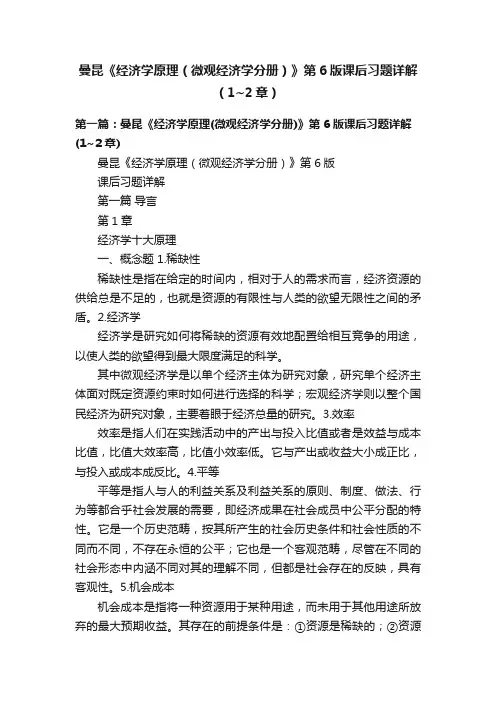
曼昆《经济学原理(微观经济学分册)》第6版课后习题详解(1~2章)第一篇:曼昆《经济学原理(微观经济学分册)》第6版课后习题详解(1~2章)曼昆《经济学原理(微观经济学分册)》第6版课后习题详解第一篇导言第1章经济学十大原理一、概念题 1.稀缺性稀缺性是指在给定的时间内,相对于人的需求而言,经济资源的供给总是不足的,也就是资源的有限性与人类的欲望无限性之间的矛盾。
2.经济学经济学是研究如何将稀缺的资源有效地配置给相互竞争的用途,以使人类的欲望得到最大限度满足的科学。
其中微观经济学是以单个经济主体为研究对象,研究单个经济主体面对既定资源约束时如何进行选择的科学;宏观经济学则以整个国民经济为研究对象,主要着眼于经济总量的研究。
3.效率效率是指人们在实践活动中的产出与投入比值或者是效益与成本比值,比值大效率高,比值小效率低。
它与产出或收益大小成正比,与投入或成本成反比。
4.平等平等是指人与人的利益关系及利益关系的原则、制度、做法、行为等都合乎社会发展的需要,即经济成果在社会成员中公平分配的特性。
它是一个历史范畴,按其所产生的社会历史条件和社会性质的不同而不同,不存在永恒的公平;它也是一个客观范畴,尽管在不同的社会形态中内涵不同对其的理解不同,但都是社会存在的反映,具有客观性。
5.机会成本机会成本是指将一种资源用于某种用途,而未用于其他用途所放弃的最大预期收益。
其存在的前提条件是:①资源是稀缺的;②资源具有多种用途;③资源的投向不受限制。
6.理性人理性人是指系统而有目的地尽最大努力去实现其目标的人,是经济研究中所假设的、在一定条件下具有典型理性行为的经济活动主体。
7.边际变动边际变动是指对行动计划的微小增量调整。
8.激励激励是指引起一个人做出某种行为的某种东西。
9.市场经济市场经济是指由家庭和企业在市场上的相互交易决定资源配置的经济,而资源配置实际上就是决定社会生产什么、生产多少、如何生产以及为谁生产的过程。
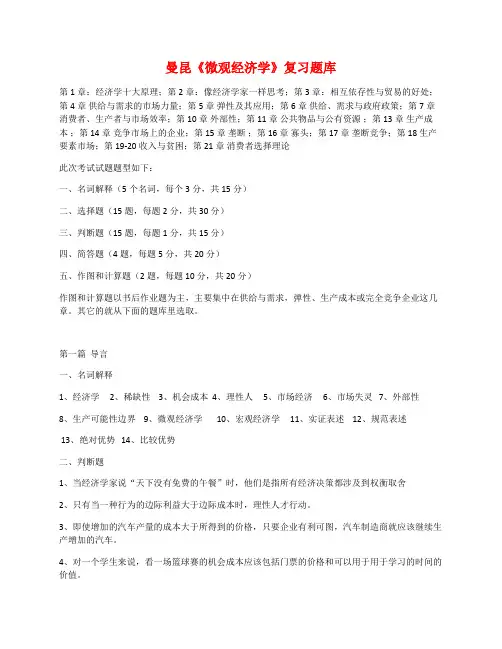
曼昆《微观经济学》复习题库第1章:经济学十大原理;第2章:像经济学家一样思考;第3章:相互依存性与贸易的好处;第4章供给与需求的市场力量;第5章弹性及其应用;第6章供给、需求与政府政策;第7章消费者、生产者与市场效率;第10章外部性;第11章公共物品与公有资源;第13章生产成本;第14章竞争市场上的企业;第15章垄断;第16章寡头;第17章垄断竞争;第18 生产要素市场;第19-20收入与贫困;第21章消费者选择理论此次考试试题题型如下:一、名词解释(5个名词,每个3分,共15分)二、选择题(15题,每题2分,共30分)三、判断题(15题,每题1分,共15分)四、简答题(4题,每题5分,共20分)五、作图和计算题(2题,每题10分,共20分)作图和计算题以书后作业题为主,主要集中在供给与需求,弹性、生产成本或完全竞争企业这几章。
其它的就从下面的题库里选取。
第一篇导言一、名词解释1、经济学2、稀缺性3、机会成本4、理性人5、市场经济6、市场失灵7、外部性8、生产可能性边界 9、微观经济学 10、宏观经济学 11、实证表述 12、规范表述13、绝对优势 14、比较优势二、判断题1、当经济学家说“天下没有免费的午餐”时,他们是指所有经济决策都涉及到权衡取舍2、只有当一种行为的边际利益大于边际成本时,理性人才行动。
3、即使增加的汽车产量的成本大于所得到的价格,只要企业有利可图,汽车制造商就应该继续生产增加的汽车。
4、对一个学生来说,看一场篮球赛的机会成本应该包括门票的价格和可以用于用于学习的时间的价值。
5、当一架喷气式飞机从头上飞过时,噪音引起外部性6、李文更擅长打扫卫生,姜飞更擅长做饭。
如果姜飞专门做饭而李文专门打扫卫生,这将比他们平等地分摊家务所需要的时间少。
7、一个农民在小麦市场上更可能有市场势力。
8、美国工人有较高的生活水平是因为美国有较高的最低工资9、在短期中,降低通货膨胀往往会引起失业减少。
一.选择题1. 经济学可定义为( )。
A. 政府对市场制度的干预;B. 消费者如何获取收入;C. 研究如何最合理地配置稀缺资源于诸多用途;D. 企业取得利润的活动。
2.“资源是稀缺的”是指( )。
A. 世界上大多数人生活在贫困中;B. 相对于资源的需求而言,资源总是不足的;C. 资源必须保留给下一代;D. 世界上资源最终将由于生产更多的物品和劳务而消耗光。
3. 经济物品是指( )。
A. 有用的物品;B. 稀缺的物品;C. 用钱购买的物品;D. 有用且稀缺的物品。
4. 一国的生产可能性曲线上的点表示( )。
A. 通货膨胀;B. 失业或者资源没有被充分利用;C. 该国可利用的资源减少及技术水平降低;D. 社会使用既定的生产资源所能生产商品的最大组合。
5. 一国生产可能性曲线以内的点表示( )。
A. 通货膨胀;B. 该国资源未被充分利用;C. 该国可被利用的资源减少;D. 该国生产处于最适度的水平。
6. 下列各项中哪一项会导致一国生产可能性曲线向外移动?( )A. 失业;B. 通货膨胀;C. 有用性资源增加或技术进步;D. 消费品生产增加,资本物品生产下降。
7. 经济学研究的基本问题包括( )。
A. 生产什么,生产多少;B. 怎样生产;C. 为谁生产;D. 以上问题均包括。
8. 花10元钱理发的机会成本是( )。
A. 10元钱的其他最好的用途;B. 用来理发的时间的其他最好的用途;C. 给理发师10元钱的价值;D. 10元钱和用来理发的时间的其他最好的用途。
9. 微观经济学解决的问题是:( )A. 资源配置问题;B. 资源利用问题;C. 单个经济单位的经济行为;D. 价格理论。
10.微观经济学与宏观经济学的区别是( )。
A. 研究方法不同;B. 研究对象不同;C. 研究范围不同;D. 上述都是。
二.判断题1.如果社会不存在稀缺性,也就不会产生经济学。
( )2.稀缺性仅仅是市场经济中所存在的问题。
( )3.资源的稀缺性决定了资源可以得到充分利用,不会出现资源浪费的现象。
微观经济学(曼昆)案例分析练习题1、假设我们有以下自行车的市场供给与需求表:a.画出自行车的供给曲线和需求曲线。
b.自行车的均衡价格是多少?c.自行车的均衡数量是多少?d.如果自行车的价格是100美元,存在过剩还是短缺?有多少单位过剩或短缺?这将引起价格上升还是下降?e.如果自行车的价格是400美元,存在过剩还是短缺?有多少单位过剩或短缺?这将引起价格上升还是下降?f.假设自行车市场的工会为增加工资而谈判。
此外,再假设这个事件增加了生产成本,使自行车制造不利,而且,在每种自行车价格时减少了自行车供给量20辆。
在图4_2中画出新的供给曲线以及原来的供给和需求曲线。
自行车市场新的均衡价格和数量是多少?【参考答案】:a.b .300美元。
c .50辆自行车。
d .短缺,70—30=40单位,价格将上升。
e .过剩,60—40=20单位,价格将下降。
f.均衡价格为400美元,均衡数量为40辆自行车。
2、假设《每日新闻》估计,如果它把自己报纸的价格从1美元提高到1.5美元,那么订户数就将从5万下降到4万。
a .当用中点法计算弹性时,《每日新闻》的需求价格弹性是多少?b .使用中点法的好处是什么?c .如果《每日新闻》只关心总收益最大化,它应该把报纸的价格从1美元提高到1.5美元吗?为什么该提价或不该提价? 【参考答案】:a .(10000/45000)/(0.50美元/1.25美元)=0.56。
b .用中点法的好处是,无论你从价格为1美元开始上升到1.5美元,还是从1.5美元开始下降到1美元,弹性的值是相同的。
c .应该提价。
因为需求价格弹性小于1(缺乏弹性),价格上升将增加总收益。
3、对下列每一对物品,你预期哪一种物品更富有供给弹性?为什么?a .电视;海滩的地产b.下一周的原油;明年的原油c.凡·高的油画;凡·高同一张油画的印刷品【参考答案】:a.电视,因为电视价格上升可以引起电视生产增加,而海滩地产是固定的。
第二篇市场如何运作第四章供给与需求的市场力量复习题1.什么是竞争市场?简单描述除了完全竞争市场之外的市场类型。
答:竞争市场是有许多买者与卖者,以至于每个人对市场价格的影响都微乎其微的市场。
除了完全竞争市场之外,还有垄断市场。
在这个市场上只有一个卖者,他决定价格。
这个卖者被称为垄断者。
还有寡头市场,在这个市场上有几个并不总是主动竞争的卖者,他们提供相似或相同的产品。
通常情况下,寡头们会尽力联合起来,避免激烈的竞争,收取较高的市场价格。
还有垄断竞争市场,这是一个有许多提供相似但不相同产品的企业的市场结构。
由于各自提供的产品不同,每个企业对产品的价格都有一定的影响力。
2.什么是需求表和需求曲线?它们如何相关联?为什么需求曲线向右下方倾斜?答:需求表是表示一种物品价格与需求量之间关系的表格,需求曲线是表示一种物品价格与需求量之间关系的图形。
需求曲线将需求表用图形的形式表现出来,需求表是需求曲线上若干个点的坐标的数字表格排列。
需求曲线向右下方倾斜是因为在其他条件不变的情况下,随着价格上升,需求量会减少。
3.消费者嗜好的变化引起了沿着需求曲线的变动,还是需求曲线的移动,价格的变化引起了沿着需求曲线的变动,还是需求曲线的移动?答:消费者嗜好的变化引起了需求曲线的移动,价格的变化引起了沿着需求曲线的变动。
4.Popeye的收入减少了,结果他买了更多的菠菜。
菠菜是低档物品,还是正常物品? Popeye菠菜的需求曲线是什么样的?答:菠菜对波匹来说是低档物品。
因为Popeye的收入减少了,他对菠菜的需求量反而增大。
波匹菠菜的需求曲线是向右下方倾斜的。
5.什么是供给表和供给曲线,它们如何关联?为什么供给曲线向石上方倾斜?答:供给表是表示一种物品价格与供给量之间关系的表格,供给曲线是表示一种物品价格与供给量之间关系的图形。
供给曲线是供给表的图形表示,供给表是供给曲线上点的坐标的数字排列。
因为在其他因素不变时,价格上升,供给量上升,所以供给曲线向右上方倾斜。
曼昆《经济学原理(微观经济学分册)》课后习题详解(第1篇)第1篇导言第1章经济学十大原理一、概念题1.稀缺性(scarcity)答:经济学研究的问题和经济物品都是以稀缺性为前提的。
稀缺性指在给定的时间内,相对于人的需求而言,经济资源的供给总是不足的,也就是资源的有用性与有限性。
人类消费各种物品的欲望是无限的,满足这种欲望的物品,有的可以不付出任何代价而随意取得,称之为自由物品,如阳光和空气;但绝大多数物品是不能自由取用的,因为世界上的资源(包括物质资源和人力资源)是有限的,这种有限的、为获取它必须付出某种代价的物品,称为“经济物品”。
正因为稀缺性的客观存在,地球上就存在着资源的有限性和人类的欲望与需求的无限性之间的矛盾。
经济学的一个重要研究任务就是:“研究人们如何进行抉择,以便使用稀缺的或有限的生产性资源(土地、劳动、资本品如机器、技术知识)来生产各种商品,并把它们分配给不同的社会成员进行消费。
”也就是从经济学角度来研究使用有限的资源来生产什么、如何生产和为谁生产的问题。
2.经济学(economics)答:经济学是研究如何将稀缺的资源有效地配置给相互竞争的用途,以使人类的欲望得到最大限度满足的科学。
时下经常见诸国内报刊文献的“现代西方经济学”一词,大多也都在这个意义上使用。
自从凯恩斯的名著《就业、利息和货币通论》于1936年发表之后,西方经济学界对经济学的研究便分为两个部分:微观经济学与宏观经济学。
微观经济学是以单个经济主体(作为消费者的单个家庭或个人,作为生产者的单个厂商或企业,以及单个产品或生产要素市场)为研究对象,研究单个经济主体面对既定的资源约束时如何进行选择的科学。
宏观经济学则以整个国民经济为研究对象,主要着眼于对经济总量的研究。
3.效率(efficiency)答:效率指人们在实践活动中的产出与投入之比值,或者是效益与成本之比值,如果比值大,效率就高;反之,比值小,效率就低。
效率与产出或者收益的大小成正比,而与成本或投入成反比,也就是说,如果想提高效率,必须降低成本或投入,提高收益或产出。
曼昆经济学练习题一、微观经济学基础1. 需求与供给如果某种商品的价格上升,其需求量会如何变化?描述一下正常商品和低档商品的供给曲线特征。
假设某商品的市场需求曲线为Qd = 100 2P,市场供给曲线为Qs = 20 + 3P,求该商品的市场均衡价格和均衡数量。
2. 弹性理论解释需求价格弹性和需求收入弹性的概念。
如果一种商品的需求价格弹性为2,价格上升10%时,需求量如何变化?讨论为什么生活必需品的需求价格弹性通常较低。
3. 消费者行为简述边际效用递减规律。
假设某消费者的效用函数为U = X^0.5 Y^0.5,预算约束为M = 100,P_X = 10,P_Y = 20,求消费者的最优消费组合。
解释消费者剩余的概念及其意义。
二、市场结构与竞争策略1. 完全竞争市场简述完全竞争市场的特征。
在长期均衡状态下,完全竞争市场的企业为何无法获得超额利润?计算一个完全竞争企业的长期平均成本曲线。
2. 垄断市场描述垄断市场的特征。
假设一个垄断企业的成本函数为C = 100 + 10Q,市场需求曲线为P = 100 5Q,求该企业的最优产量和价格。
讨论垄断企业定价策略与完全竞争企业的区别。
3. 寡头垄断市场解释Cournot模型和Stackelberg模型的基本原理。
假设有两个寡头企业,市场需求曲线为P = 100 Q,企业的成本函数分别为C_1 = 20 + 2Q_1和C_2 = 30 + 3Q_2,求Cournot均衡下的产量和价格。
讨论价格领导模型在寡头垄断市场中的应用。
三、宏观经济政策与分析1. 国民收入决定理论简述凯恩斯消费理论的核心观点。
假设一个封闭经济体的消费函数为C = 100 + 0.8(Y T),投资函数为I = 200 10r,政府购买为G = 200,税收为T = 100,求均衡的国民收入。
解释乘数效应及其在财政政策中的作用。
2. 通货膨胀与失业描述菲利普斯曲线的基本内容。
假设短期内菲利普斯曲线为π = π_e 0.5(u u_n),其中π_e为预期通货膨胀率,u_n为自然失业率,求当预期通货膨胀率为5%时,实际通货膨胀率为8%时的失业率。
微观经济学曼昆案例分析练习题IMB standardization office【IMB 5AB- IMBK 08- IMB 2C】微观经济学(曼昆)案例分析练习题1、假设我们有以下自行车的市场供给与需求表:a.画出自行车的供给曲线和需求曲线。
b.自行车的均衡价格是多少?c.自行车的均衡数量是多少?d.如果自行车的价格是100美元,存在过剩还是短缺有多少单位过剩或短缺这将引起价格上升还是下降e.如果自行车的价格是400美元,存在过剩还是短缺有多少单位过剩或短缺这将引起价格上升还是下降f.假设自行车市场的工会为增加工资而谈判。
此外,再假设这个事件增加了生产成本,使自行车制造不利,而且,在每种自行车价格时减少了自行车供给量20辆。
在图4_2中画出新的供给曲线以及原来的供给和需求曲线。
自行车市场新的均衡价格和数量是多少?【参考答案】:a.b .300美元。
c .50辆自行车。
d .短缺,70—30=40单位,价格将上升。
e .过剩,60—40=20单位,价格将下降。
f.均衡价格为400美元,均衡数量为40辆自行车。
2、假设《每日新闻》估计,如果它把自己报纸的价格从1美元提高到1.5美元,那么订户数就将从5万下降到4万。
a .当用中点法计算弹性时,《每日新闻》的需求价格弹性是多少?b .使用中点法的好处是什么?c .如果《每日新闻》只关心总收益最大化,它应该把报纸的价格从1美元提高到1.5美元吗为什么该提价或不该提价【参考答案】:a .(10000/45000)/美元/美元)=。
b.用中点法的好处是,无论你从价格为1美元开始上升到美元,还是从美元开始下降到1美元,弹性的值是相同的。
c.应该提价。
因为需求价格弹性小于1(缺乏弹性),价格上升将增加总收益。
3、对下列每一对物品,你预期哪一种物品更富有供给弹性为什么a.电视;海滩的地产b.下一周的原油;明年的原油c.凡·高的油画;凡·高同一张油画的印刷品【参考答案】:a.电视,因为电视价格上升可以引起电视生产增加,而海滩地产是固定的。
1. Describe some of the trade-offs faced by each ofthe following:a. a family deciding whether to buy a new carb. a member of Congress deciding how muchto spend on national parksc. a company president deciding whether toopen a new factoryd. a professor deciding how much to preparefor classe. a recent college graduate deciding whetherto go to graduate school2. You are trying to decide whether to take avacation. Most of the costs of the vacation (airfare,hotel, and forgone wages) are measured indollars, but the benefits of the vacation are psychological. How can you compare the benefitsto the costs?3. You were planning to spend Saturday workingat your part-time job, but a friend asks you togo skiing. What is the true cost of going skiing?Now suppose you had been planning to spendthe day studying at the library. What is the costof going skiing in this case? Explain.4. You win $100 in a basketball pool. You havea choice between spending the money now orputting it away for a year in a bank accountthat pays 5 percent interest. What is the opportunitycost of spending the $100 now?5. The company that you manage has invested$5 million in developing a new product, but thedevelopment is not quite finished. At a recentmeeting, your salespeople report that the introductionof competing products has reducedthe expected sales of your new product to$3 million. If it would cost $1 million to finish development and make the product, shouldyou go ahead and do so? What is the most thatyou should pay to complete development?6. The Social Security system provides income forpeople over age 65. If a recipient of SocialSecurity decides to work and earn someincome, the amount he or she receives in SocialSecurity benefits is typically reduced.a. How does the provision of Social Securityaffect people’s incentive to save whileworking?b. How does the reduction in benefits associated with higher earnings affect people’sincentive to work past age 65?7. A 1996 bill reforming the federal government’s antipoverty programs limited many welfarerecipients to only two years of benefits.a. How does this change affect the incentivesfor working?b. How might this change represent a trade-off between equality and efficiency?8. Your roommate is a better cook than you are,but you can clean more quickly than yourroommate can. If your roommate did all thecooking and you did all the cleaning, wouldyour chores take you more or less time than ifyou divided each task evenly? Give a similar example of how specialization and trade canmake two countries both better off.9. Explain whether each of the following government activities is motivated by a concern aboutequality or a concern about efficiency. In thecase of efficiency, discuss the type of market failure involved.a. regulating cable TV pricesb. providing some poor people with vouchersthat can be used to buy foodc. prohibiting smoking in public placesd. breaking up Standard Oil (which onceowned 90 percent of all oil refineries) into several smaller companiese. imposing higher personal income tax rateson people with higher incomesf. instituting laws against driving while intoxicated10. Discuss each of the following statements from the standpoints of equality and efficiency.a. “Everyone in society should be guaranteedthe best healthcare possible.”b. “When workers are laid off, they should beable to collect unemployment benefits untilthey find a new job.”11. In what ways is your standard of living different from that of your parents or grandparentswhen they were your age? Why have thesechanges occurred?12. Suppose Americans decide to save more oftheir incomes. If banks lend this extra saving to businesses, which use the funds to build new factories, how might this lead to faster growthin productivity? Who do you suppose benefitsfrom the higher productivity? Is society gettinga free lunch?13. In 2010, President Barack Obama and Congress enacted a healthcare reform bill in the United States. Two goals of the bill were to providemore Americans with health insurance (via subsidies for lower-income households financedby taxes on higher-income households) andto reduce the cost of healthcare (via variousreforms in how healthcare is provided).a. How do these goals relate to equality and efficiency?b. How might healthcare reform increase productivity in the United States?c. How might healthcare reform decrease productivity in the United States?14. During the Revolutionary War, the American colonies could not raise enough tax revenueto fully fund the war effort; to make up this difference, the colonies decided to print more money. Printing money to cover expendituresis sometimes referred to as an “inflation tax.”Who do you think is being “taxed” when moremoney is printed? Why?15. Imagine that you are a policymaker trying to decide whether to reduce the rate of inflation.To make an intelligent decision, what wouldyou need to know about inflation, unemployment,and the trade-off between them?16. A policymaker is deciding how to finance the construction of a new airport. He can eitherpay for it by increasing citizens’ taxes or by printing more money. What are some of theshort-run and long-run consequences of eachoption?1. Draw a circular-flow diagram. Identify theparts of the model that correspond to the flowof goods and services and the flow of dollarsfor each of the following activities.a. Selena pays a storekeeper $1 for a quart of milk.b. Stuart earns $4.50 per hour working at a fastfood restaurant.c. Shanna spends $30 to get a haircut.d. Sally earns $10,000 from her 10 percent ownershipof Acme Industrial.2. Imagine a society that produces military goods and consumer goods, which we’ll call “guns”and “butter.”a. Draw a production possibilities frontier for guns and butter. Using the concept of opportunity cost, explain why it most likely has abowed-out shape.b. Show a point that is impossible for the economy to achieve. Show a point that is feasiblebut inefficient.c. Imagine that the society has two political parties, called the Hawks (who want astrong military) and the Doves (who want asmaller military). Show a point on your production possibilities frontier that the Hawksmight choose and a point the Doves mightchoose.d. Imagine that an aggressive neighboringcountry reduces the size of its military. As a result, both the Hawks and the Doves reducetheir desired production of guns by the same amount. Which party would get the bigger“peace dividend,” measured by the increasein butter production? Explain.3. The first principle of economics discussed in Chapter 1 is that people face trade-offs. Usea production possibilities frontier to illustrate society’s trade-off between two “goods”—aclean environment and the quantity of industrial output. What do you suppose determinesthe shape and position of the frontier? Showwhat happens to the frontier if engineersdevelop a new way of producing electricitythat emits fewer pollutants.4. An economy consists of three workers: Larry, Moe, and Curly. Each works ten hours a dayand can produce two services: mowing lawnsand washing cars. In an hour, Larry can eithermow one lawn or wash one car; Moe can eithermow one lawn or wash two cars; and Curlycan either mow two lawns or wash one car.a. Calculate how much of each service is produced under the following circumstances,which we label A, B, C, and D:• All three spend all their time mowinglawns. (A)• All three spend all their time washingcars. (B)• All three spend half their time on eachactivity. (C)• Larry spends half his time on each activity, while Moe only washes cars and Curlyonly mows lawns. (D)b. Graph the production possibilities frontierfor this economy. Using your answers topart (a), identify points A, B, C, and D onyour graph.c. Explain why the production possibilitiesfrontier has the shape it does.d. Are any of the allocations calculated in part(a) inefficient? Explain.5. Classify the following topics as relating to microeconomics or macroeconomics.a. a family’s decision about how much incometo saveb. the effect of government regulations on auto emissionsc. the impact of higher national saving on economic growthd. a firm’s decision about how many workersto hiree. the relationship between the inflation rateand changes in the quantity of money6. Classify each of the following statements as positive or normative. Explain.a. Society faces a short-run trade-off between inflation and unemployment.b. A reduction in the rate of money growth will reduce the rate of inflation.c. The Federal Reserve should reduce the rateof money growth.d. Society ought to require welfare recipients to look for jobs.e. Lower tax rates encourage more work andmore saving.7. If you were president, would you be more interested in your economic advisers’ positive views or their normative views? Why?1. Maria can read 20 pages of economics in an hour. She can also read 50 pages of sociology in an hour. She spends 5 hours per day studying.a. Draw Maria’s production possibilities frontier for reading economics and sociology.b. What is Maria’s opportunity cost of reading 100 pages of sociology?2. American and Japanese workers can each produce 4 cars a year. An American worker canproduce 10 tons of grain a year, whereas a Japanese worker can produce 5 tons of grain a year. To keep things simple, assume that each country has 100 million workers.a. For this situation, construct a table analogous to the table in Figure 1.b. Graph the production possibilities frontier of the American and Japanese economies.c. For the United States, what is the opportunity cost of a car? Of grain? For Japan, what is the opportunity cost of a car? Of grain? Put this information in a table analogous to Table 1.d. Which country has an absolute advantage in producing cars? In producing grain?e. Which country has a comparative advantagein producing cars? In producing grain?f. Without trade, half of each country’s workers produce cars and half produce grain. What quantities of cars and grain does each country produce?g. Starting from a position without trade, givean example in which trade makes each countrybetter off.3. Pat and Kris are roommates. They spend mostof their time studying (of course), but they leave some time for their favorite activities: making pizza and brewing root beer. Pat takes 4 hoursto brew a gallon of root beer and 2 hours tomake a pizza. Kris takes 6 hours to brew a gallonof root beer and 4 hours to make a pizza.a. What is each roommate’s opportunity costof making a pizza? Who has the absoluteadvantage in making pizza? Who has thecomparative advantage in making pizza?b. If Pat and Kris trade foods with each other,who will trade away pizza in exchange forroot beer?c. The price of pizza can be expressed in termsof gallons of root beer. What is the highestprice at which pizza can be traded thatwould make both roommates better off?What is the lowest price? Explain.4. Suppose that there are 10 million workers in Canada and that each of these workers can produce either 2 cars or 30 bushels of wheat in a year.a. What is the opportunity cost of producing acar in Canada? What is the opportunity costof producing a bushel of wheat in Canada?Explain the relationship between the opportunity costs of the two goods.b. Draw Canada’s production possibilities frontier. If Canada chooses to consume 10 millioncars, how much wheat can it consume withouttrade? Label this point on the production possibilities frontier.c. Now suppose that the United States offers tobuy 10 million cars from Canada in exchangefor 20 bushels of wheat per car. If Canadacontinues to consume 10 million cars, howmuch wheat does this deal allow Canada to consume? Label this point on your diagram.Should Canada accept the deal?5. England and Scotland both produce scones and sweaters. Suppose that an English worker can produce 50 scones per hour or 1 sweater perhour. Suppose that a Scottish worker can produce40 scones per hour or 2 sweaters per hour.a. Which country has the absolute advantage inthe production of each good? Which countryhas the comparative advantage?b. If England and Scotland decide to trade,which commodity will Scotland trade toEngland? Explain.c. If a Scottish worker could produce only 1sweater per hour, would Scotland still gainfrom trade? Would England still gain fromtrade? Explain.6. The following table describes the production possibilities of two cities in the country of Baseballia:Pairs of Red Socks Pairs of White Socksper Worker per Hour per Worker per HourBoston 3 3Chicago 2 1a. Without trade, what is the price of whitesocks (in terms of red socks) in Boston? Whatis the price in Chicago?b. Which city has an absolute advantage in theproduction of each color sock? Which city hasa comparative advantage in the production ofeach color sock?c. If the cities trade with each other, which colorsock will each export?d. What is the range of prices at which trade canoccur?7. Suppose that in a year an American workercan produce 100 shirts or 20 computers, whilea Chinese worker can produce 100 shirts or10 computers.a. Graph the production possibilities curve forthe two countries. Suppose that without tradethe workers in each country spend half theirtime producing each good. Identify this pointin your graph.b. If these countries were open to trade, whichcountry would export shirts? Give a specificnumerical example and show it on yourgraph. Which country would benefit fromtrade? Explain.c. Explain at what price of computers (in termsof shirts) the two countries might trade.d. Suppose that China catches up withAmerican productivity so that a Chineseworker can produce 100 shirts or 20 computers.What pattern of trade would youpredict now? How does this advancein Chinese productivity affect the economicwell-being of the citizens of the twocountries?8. An average worker in Brazil can produce anounce of soybeans in 20 minutes and an ounceof coffee in 60 minutes, while an average workerin Peru can produce an ounce of soybeans in50 minutes and an ounce of coffee in 75 minutes.a. Who has the absolute advantage in coffee?Explain.b. Who has the comparative advantage in coffee? Explain.c. If the two countries specialize and tradewith each other, who will import coffee?Explain.d. Assume that the two countries trade and thatthe country importing coffee trades 2 ouncesof soybeans for 1 ounce of coffee. Explain whyboth countries will benefit from this trade.9. Are the following statements true or false?Explain in each case.a. “Two countries can achieve gains from tradeeven if one of the countries has an absolute advantage in the production of all goods.”b. “Certain very talented people have a comparative advantage in everything they do.”c. “If a certain trade is good for one person, it can’t be good for the other one.”d. “If a certain trade is good for one person, it is always good for the other one.”e. “If trade is good for a country, it must begood for everyone in the country.”10. The United States exports corn and aircraft to the rest of the world, and it imports oil and clothing from the rest of the world. Do you think this pattern of trade is consistent with the principle of comparative advantage? Why or why not?11. Bill and Hillary produce food and clothing. Inan hour, Bill can produce 1 unit of food or 1 unitof clothing, while Hillary can produce 2 unitsof food or 3 units of clothing. They each work10 hours a day.a. Who has an absolute advantage in producingfood? Who has an absolute advantage in producing clothing? Explain.b. Who has a comparative advantage in producing food? Who has a comparative advantagein producing clothing? Explain.c. Draw the production possibilities frontierfor the household (that is, Bill and Hillary together) assuming that each spends thesame number of hours each day as the otherproducing food and clothing.d. Hillary suggests, instead, that she specializein making clothing. That is, she will do all the clothing production for the family; however, ifall her time is devoted to clothing and they still want more, then Bill can help with clothing production. What does the household production possibilities frontier look like now?e. Bill suggests that Hillary specialize in producing food. That is, Hillary will do all the food production for the family; however, if all hertime is devoted to food and they still wantmore, then Bill can help with food production.What does the household production possibilities frontier look like under Bill’s proposal?f. Comparing your answers to parts c, d, and e,which allocation of time makes the mostsense? Relate your answer to the theory of comparative advantage.1. Explain each of the following statements using supply-and-demand diagrams.a. “When a cold snap hits Florida, the price of orange juice rises in supermarkets throughoutthe country.”b. “When the weather turns warm in NewEngland every summer, the price of hotelrooms in Caribbean resorts plummets.”c. “When a war breaks out in the Middle East,the price of gasoline rises, and the price of aused Cadillac falls.”2. “An increase in the demand for notebooksraisesthe quantity of notebooks demanded butnot the quantity supplied.” Is this statement true or false? Explain.3. Consider the market for minivans. For eachof the events listed here, identify which of the determinants of demand or supply are affected. Also indicate whether demand or supplyincreases or decreases. Then draw a diagramto show the effect on the price and quantity of minivans.a. People decide to have more children.b. A strike by steelworkers raises steel prices.c. Engineers develop new automated machineryfor the production of minivans.d. The price of sports utility vehicles rises.e. A stock-market crash lowers people’s wealth.4. Consider the markets for DVDs, TV screens,and tickets at movie theaters.a. For each pair, identify whether they are complementsor substitutes:• DVDs and TV screens• DVDs and movie tickets• TV screens and movie ticketsb. Suppose a technological advance reduces the cost of manufacturing TV screens. Draw adiagram to show what happens in the marketfor TV screens.c. Draw two more diagrams to show how thechange in the market for TV screens affectsthe markets for DVDs and movie tickets.5. Over the past 30 years, technological advances have reduced the cost of computer chips. Howdo you think this has affected the marketfor computers? For computer software? For typewriters?6. Using supply-and-demand diagrams, show the effect of the following events on the market for sweatshirts.a. A hurricane in South Carolina damages the cotton crop.b. The price of leather jackets falls.c. All colleges require morning exercise inappropriate attire.d. New knitting machines are invented.7. A survey shows an increase in drug use byyoung people. In the ensuing debate, twohypotheses are proposed:• Reduced police efforts have increased the availability of drugs on the street.• Cutbacks in education efforts havedecreased awareness of the dangers of drug addiction.a Use supply-and-demand diagrams to showhow each of these hypotheses could lead toan increase in quantity of drugs consumed.b How could information on what has happenedto the price of drugs help us to distinguish between these explanations?8. Suppose that in the year 2015 the number ofbirths is temporarily high. How does this babyboom affect the price of babysitting services in 2020 and 2030? (Hint: 5-year-olds need babysitters, whereas 15-year-olds can be babysitters.)9. Ketchup is a complement (as well as a condiment) for hot dogs. If the price of hot dogs rises,what happens to the market for ketchup? For tomatoes? For tomato juice? For orange juice?10. The market for pizza has the following demand and supply schedules:Price Quantity Demanded Quantity Supplied$4 135 pizzas 26 pizzas5 104 536 81 817 68 988 53 1109 39 121a. Graph the demand and supply curves. Whatis the equilibrium price and quantity in this market?b. If the actual price in this market were abovethe equilibrium price, what would drive themarket toward the equilibrium?c. If the actual price in this market were belowthe equilibrium price, what would drive themarket toward the equilibrium?11. Consider the following events: Scientists revealthat consumption of oranges decreases the riskof diabetes, and at the same time, farmers usea new fertilizer that makes orange trees more productive. Illustrate and explain what effect these changes have on the equilibrium price and quantity of oranges.12. Because bagels and cream cheese are often eaten together, they are complements.a. We observe that both the equilibrium price of cream cheese and the equilibrium quantity ofbagels have risen. What could be responsiblefor this pattern—a fall in the price of flouror a fall in the price of milk? Illustrate and explain your answer.b. Suppose instead that the equilibriumprice of cream cheese has risen but theequilibrium quantity of bagels has fallen.What could be responsible for this pattern—a rise in the price of flour or a rise in theprice of milk? Illustrate and explain your answer.13. Suppose that the price of basketball tickets at your college is determined by market forces. Currently, the demand and supply schedulesare as follows:Price Quantity Demanded Quantity Supplied$ 4 10,000 tickets 8,000 tickets8 8,000 8,00012 6,000 8,00016 4,000 8,00020 2,000 8,000a. Draw the demand and supply curves. Whatis unusual about this supply curve? Whymight this be true?b. What are the equilibrium price and quantityof tickets?c. Your college plans to increase total enrollment next year by 5,000 students. Theadditional students will have the following demand schedule:Price Quantity Demanded$ 4 4,000 tickets8 3,00012 2,00016 1,00020 0Now add the old demand schedule and thedemand schedule for the new students tocalculate the new demand schedule for theentire college. What will be the new equilibrium price and quantity?14. Market research has revealed the following information about the market for chocolate bars:The demand schedule can be represented bythe equation Q D = 1,600 – 300P, where Q D is the quantity demanded and P is the price. The supply schedule can be represented by the equationQ S = 1,400 + 700P, where Q S is the quantity supplied. Calculate the equilibrium price and quantityin the market for chocolate bars.1. For each of the following pairs of goods, which good would you expect to have more elasticdemand and why?a. required textbooks or mystery novelsb. Beethoven recordings or classical musicrecordings in generalc. subway rides during the next six months orsubway rides during the next five yearsd. root beer or water2. Suppose that business travelers and vacationers have the following demand for airline ticketsfrom New York to Boston:Quantity Demanded Quantity DemandedPrice (business travelers) (vacationers)$150 2,100 tickets 1,000 tickets200 2,000 800250 1,900 600300 1,800 400a. As the price of tickets rises from $200 to$250, what is the price elasticity of demandfor (i) business travelers and (ii) vacationers? (Use the midpoint method in yourcalculations.)b. Why might vacationers have a differentelasticity from business travelers?3. Suppose the price elasticity of demand forheating oil is 0.2 in the short run and 0.7 in the long run.a. if the price of heating oil rises from $1.80to $2.20 per gallon, what happens to thequantity of heating oil demanded in the shortrun? In the long run? (Use the midpointmethod in your calculations.)b. Why might this elasticity depend on the time horizon?4. A price change causes the quantity demandedof a good to decrease by 30 percent, whilethe total revenue of that good increases by15 percent. Is the demand curve elastic or inelastic? Explain.5. The equilibrium price of coffee mugs rose sharply last month, but the equilibrium quantity wasthe same as ever. Three people tried to explainthe situation. Which explanations could beright? Explain your logic.Billy: Demand increased, but supply wastotally inelastic.Marian: Supply increased, but so diddemand.Valerie: Supply decreased, but demand wastotally inelastic.6. Suppose that your demand schedule for DVDsis as follows:Quantity Demanded Quantity DemandedPrice (income = $10,000) (income = $12,000)$ 8 40 DVDs 50 DVDs10 32 4512 24 3014 16 2016 8 12a. Use the midpoint method to calculate yourprice elasticity of demand as the price ofDVDs increases from $8 to $10 if (i) yourincome is $10,000 and (ii) your income is$12,000.b. Calculate your income elasticity of demandas your income increases from $10,000 to$12,000 if (i) the price is $12 and (ii) the price is $16.7. You have the following information about goodX and good Y:• Income elasticity of demand for good X: –3• Cross-price elasticity of demand for good Xwith respect to the price of good Y: 2Would an increase in income and a decrease inthe price of good Y unambiguously decreasethe demand for good X? Why or why not?8. Maria has decided always to spend one-third of her income on clothing.a. What is her income elasticity of clothing demand?b. What is her price elasticity of clothing demand?c. If Maria’s tastes change and she decidesto spend only one-fourth of her incomeon clothing, how does her demand curvechange? What is her income elasticity andprice elasticity now?9. The New York Times reported (Feb. 17, 1996) that subway ridership declined after a fare increase: “There were nearly four million fewer ridersin December 1995, the first full month after the price of a token increased 25 cents to $1.50, than in the previous December, a 4.3 percent decline.”a. Use these data to estimate the price elasticity of demand for subway rides.b. According to your estimate, what happensto the Transit Authority’s revenue when thefare rises?c. Why might your estimate of the elasticity be unreliable?10. Two drivers—Tom and Jerry—each drive up toa gas station. Before looking at the price, each places an order. Tom says, “I’d like 10 gallonsof gas.” Jerry says, “I’d like $10 worth of gas.”What is each driver’s price elasticity of demand?11. Consider public policy aimed at smoking.a. Studies indicate that the price elasticity of demand for cigarettes is about 0.4. If a packof cigarettes currently costs $2 and thegovernmentwants to reduce smoking by20 percent, by how much should it increasethe price?b. If the government permanently increasesthe price of cigarettes, will the policy have a。